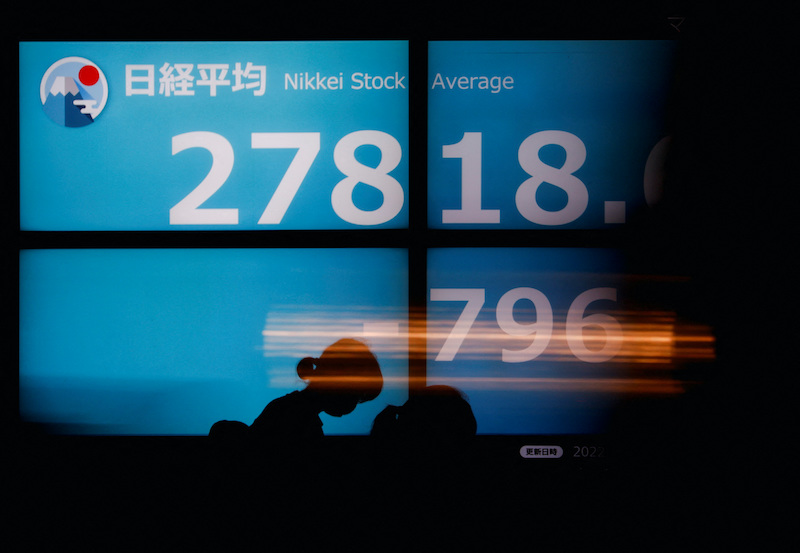Asia’s major stock markets retreated on Monday with anxiety over the escalating situation in the Middle East unnerving investors across the region.
The prospect that the conflict in Gaza could spread beyond Israel and Hamas into the wider region as crude oil held above $90 a barrel, equities slid and the safe-haven dollar strengthened.
Japan’s Nikkei share average declined over 2%, dragged by chip-related shares, with risk appetite being hurt as tensions in the Middle East weighed.
Also on AF: Updated US Rules May Ban Sale of ‘Fast’ AI Chips to China
The Nikkei share average dropped 2.03%, or 656.96 points, to close at 31,659.03, while the broader Topix was down 1.53%, or 35.21 points, to 2,273.54.
The Nikkei 225 volatility index jumped 4.67% to 21.90, its highest since October 4, when the Nikkei lost 2.3% in its biggest daily decline in two months
Heavyweight chip-related stocks fell, tracking US technology stocks, with Tokyo Electron and Advantest falling 3.84% and 4.79%, respectively.
China stocks fell, too, tracking global weakness on concerns Middle East conflicts could widen, despite some stabilising signs in the country’s economic recovery and the authorities’ latest measures to shore up investor confidence.
China released a mixed batch of economic data on Friday showing a slump in exports and imports was gradually easing, but lingering deflationary pressures underlined the challenges policymakers face in trying to engineer a stronger economic recovery.
To boost sentiment, China’s securities regulator on Saturday said it would restrict securities lending businesses and tighten scrutiny on improper regulatory arbitrage.
The blue-chip CSI 300 Index lost 1.00% and the Shanghai Composite Index fell 0.46%, or 14.29 points, to 3,073.81. The Shenzhen Composite Index on China’s second exchange retreated 1.11%, or 21.09 points, to 1,884.32.
Tech giants listed in Hong Kong lost 1.1% and the Hang Seng Index lost 0.97%, or 173.09 points, to 17,640.36. The Hang Seng China Enterprises Index declined 1.08%.
Blinken Visiting Middle East
Elsewhere across the region, in earlier trade, Singapore, Seoul, Taipei, Wellington and Manila were all down while Mumbai crept ahead.
Israel’s shekel sank to a more than eight-year low after the country’s prime minister, Benjamin Netanyahu, vowed to “demolish Hamas” in retaliation for the rampage on October 7 that killed 1,300 people in the worst attack on civilians in Israel’s history.
US Secretary of State Antony Blinken is visiting the region, seeking to prevent further escalation. Netanyahu agreed to lift a blockade of water supplies to parts of southern Gaza after speaking with U.S. President Joe Biden.
On Friday, the pan-European STOXX 600 index lost nearly 1% and New York’s S&P 500 declined 0.5%, although US stock futures pointed 0.2% higher on Monday.
Currencies overall retraced some of their moves from the end of the week, with the US dollar index easing slightly to 106.51 from as high as 106.79 on Friday.
The euro rose 0.14% to $1.05255 while the yen was little changed at 149.445 per dollar.
Benchmark 10-year US Treasury yields edged up to 4.6581%, following a more than 8 basis point decline on Friday amid demand for the safety of bonds.
Gold pared about $12 of Friday’s $63 gain, retreating 0.6% to $1,919.29 per ounce.
Key figures
Tokyo – Nikkei 225 < DOWN 2.03% at 31,659.03 (close)
Hong Kong – Hang Seng Index < DOWN 0.97% at 17,640.36 (close)
Shanghai – Composite < DOWN 0.46% at 3,073.81 (close)
London – FTSE 100 > UP 0.04% at 7,602.29 (0936 BST)
New York – Dow > UP 0.12% at 33,670.29 (Friday close)
- Reuters with additional editing by Sean O’Meara
Read more:
Fears of China’s ‘Japanization’ Weigh On Asia Economic Outlook
China Restricts Securities Lending in Short-Selling Clampdown
Fears Over Evergrande Debts Spurs Run on China Bank – CNN
Hang Seng Slumps, Nikkei Slides as Rate Rises Threat Returns
























